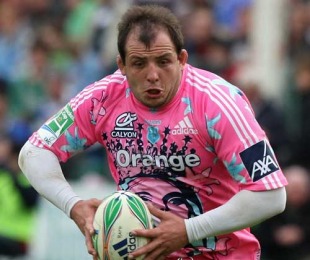|
French Rugby
A dangerous path
Ian Moriarty
February 23, 2010

David Attoub's ban has opened a can of worms in France
© Getty Images
Enlarge
On January 19, Stade Francais prop David Attoub learned that he had been banned for 70 weeks for what ERC disciplinary officer Judge Jeff Blackett described as "the worst act of contact with the eyes that I have had to deal with." Devastated with the decision, Attoub took his case that evening to the callers of Vincent Moscato's show on French radio station RMC. Few callers debated the seriousness of the charge laid against the prop or indeed, the gravity of Blackett's words. Instead Attoub listened as caller after caller told the airwaves that the Stade Francais player was being stitched up, that the photos were doctored or that he was an innocent victim; that he and fellow banned Stade Francais team mate Julien Dupuy were guilty of being French - the ultimate crime! Now, in light of the bans to Attoub and Dupuy and with poorly handled cases such as the Marius Tincu affair still in the rear view mirror, the French rugby administration has finally reacted. A new joint commission has reportedly been established by the Federation Francaise de Rugby (FFR) and Ligue National de Rugby (LNR), and tasked with re-examining players' bans received at international level has been established in France which could effectively render null and void any sanction handed down at Heineken Cup or international level. While the Attoub and Dupuy bans might be the most recent, Tincu's ban was the one that really kicked things off. Suspended last year for 18 weeks for eye-gouging during a Heineken Cup tie, the Perpignan hooker took his case to the CNOSF (Committee National Olympique et Sportif Francaise) and won, prompting the LNR to say:"This decision marks the first step in affirming the primacy of French law over all other considerations within the framework of the course of disciplinary proceedings." Dupuy, the Stade Francais scrum-half who is currently serving a six month ban for gouging Ulster's blindside flanker Stephen Ferris in January, allegedly appeared in front of the commission a few weeks ago. Although there has been no official word, he could be back playing for his club on March 6, according to media reports in France. Attoub too, is expected to appear in front of the commission after his own ERC disciplinary appeal on March 2. Without hypothesising too much, where will this end? Will every ban handed down to a French player at ERC level now be challenged? Stade Francais president Max Guazzini clearly thinks so. "It's not normal that a private organisation in Ireland prevents a club employee from working, from playing. It is we who pay [the player]," Guazzini told journalists after the Dupuy hearing. So what caused the French to go down this road? It's clear that the Attoub and Dupuy citings brought the issue of how French players are disciplined outside of France sharply into focus once more. Simply put, the FFR and LNR's commission appeared as a response to the murmurings in France that they were doing nothing to protect French players against injustice. Sound like paranoia? Funnier things have happened. Back in January, Guazzini called his players' bans "political and anti-French", a common sentiment in a country that proudly sees itself as a cultural bulwark against the U.S. and Britain. Correctly or not, there's been an overwhelming sense of victimhood emanating from France for many years now and the shoddy disciplinary procedures and topsy-turvy bans have undoubtedly added to this. So are the French overreacting with all this? Well, yes and no, if that's not a fudge. There is no doubting that their views of the disciplinary processes in rugby have been blinkered by distrust. Yet while a British or Irish club will see a botched disciplinary decision as further proof of the inadequacies of the disciplinary process, their Top 14 rivals see it as further proof of an anti-French conspiracy. Yet, little things should be done to level the playing field for French clubs. Referees should have the ability to speak at least a few key French phrases for reffing the breakdown, for example. The culture of misinformation in France could be stymied if organisations such as ERC actually spent money to get their message out there. Finally, the IRB could us all a favour by making sure all sanctions are properly bound to and cast-iron, for once and for all. In the meantime, we shall watch with interest the attempts by one of the IRB's member unions to effectively detach its disciplinary process from everyone else's. One wonders what IRB president Bernard Lapasset thinks of his countrymen's efforts? © Scrum.com
|
Live Sports
Communication error please reload the page.
-
Football
-
Cricket
-
Rugby
-
- Days
- Hrs
- Mins
- Secs
F1 - Abu Dhabi GP
Abu Dhabi Grand Prix December 11-131. Max Verstappen ()
2. Valtteri Bottas (Mercedes)
3. Lewis Hamilton (Mercedes)
4. Alexander Albon ()
5. Lando Norris ()
6. Carlos Sainz Jr ()
-
ESPNOtherLive >>
Golf - Houston Open
Snooker - China Open
Tennis - Miami Open

